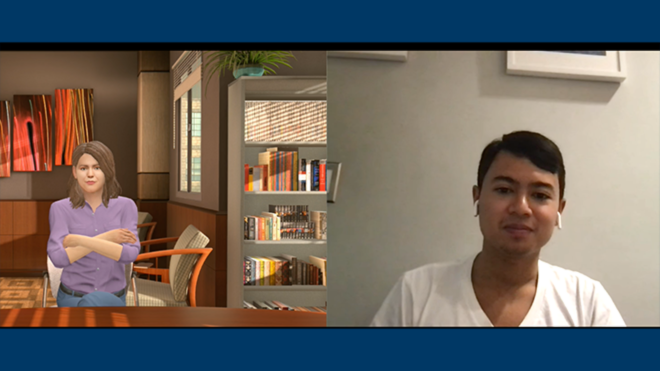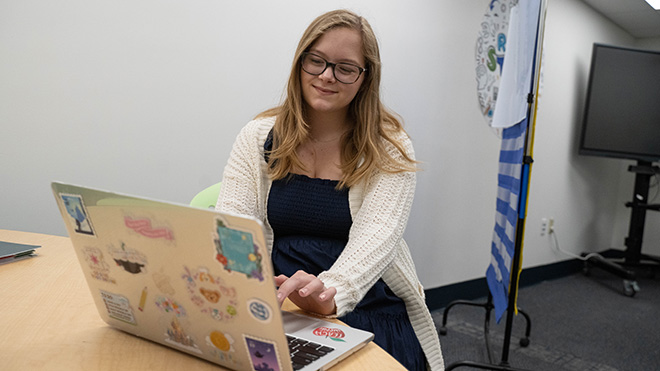Immersed in Mursion
RWU has the only Education program in R.I. with a cutting-edge virtual training program preparing students for teaching careers

BRISTOL, R.I. – As a new full-time Spanish teacher at Barrington Middle School in Rhode Island, Kyle Villella ’23 has begun meeting with parents and holding parent-teacher conferences for the first time.
But, thanks to a virtual education training program called Mursion that Villella used as part of his studies at Roger Williams University, he said he’s well prepared for these interactions.
“Mursion allows you to do simulations that you might not get to do during your student teaching practicum,” said Villella, of Barrington, who graduated with Secondary Education and Spanish degrees and is a current M.A. candidate in Special Education at Roger Williams. “It prepared me for when I have to meet with parents now. I gained experience in how to run a parent-teacher conference and speak with parents.”
Mursion is a virtual training program designed to prepare educators for all types of situations – from “mastering instructional moves to fostering social-emotional learning,” according to its website. Simulations, which are avatar-based and use a combination of live real-time human conversation and artificial intelligence, are unique to each user. Students can practice effective communication and behavior management skills in virtual pre-K, upper elementary, middle, and high school classrooms, preparing them for successful student teaching placements and careers.
RWU’s Education Department added Mursion to the curriculum in 2020. To date, it’s the only education program in Rhode Island using the AI tool to train teacher candidates, said Kimberlee Johnsen-Smith, the department’s Director of Strategic Partnerships, Clinical Field Experiences, and Compliance.
“We are proud to be leaders in the state,” she said.
The program, which is standards-based, equity-focused, and inclusive, targets improved learning outcomes in high need areas and enhances professional opportunities in critical state-standard-aligned areas such as social-emotional learning, multilingual learners, data-driven instruction, and family engagement, Johnsen-Smith said. The simulations improve students’ “resilience to diverse challenges they will face every day in the classroom,” she said.
How Mursion Works

Training with Mursion is required as part of Education students’ clinical experiences at RWU. Students complete the exercises in the Education Department’s model classroom. The room is designed to resemble elementary and secondary classrooms and includes a virtual teaching section, where students sit at a desk and connect their laptop to a large monitor.
“We use the model classroom because we want the experience to be as authentic to what it would be like when they’re actually teaching,” said Assistant Professor of Special Education Lindsey Pike, whose Introduction to Inclusive Practices course had students use Mursion last month as part of an assignment on addressing student behavior.
Prior to a session, students receive information explaining a particular simulation and can ask questions. Scenarios are tailored to each individual user, and the difficulty level can vary. Most include a broad topic such as “introducing content,” which lets users choose the subject and lesson plan.
Once they log in, the session resembles a Zoom call: the student in one screen and the virtual classroom in another. They deliver their lesson to avatar students who are voiced by live actors, and respond when students ask questions, interrupt, or have side conversations.
After 15 minutes, the program offers live guided reflection – letting students think about what went well and what didn’t – and provides immediate feedback with performance outcome data.
A Low-Stakes Way to Practice Classroom Management
Research shows that one area where new teachers feel they need the most support is in classroom management, or the ways to address student behavior and social-emotional learning, according to Pike. “Using Mursion provides a low-stakes opportunity for students to practice things we talked about in class related to ways to address student behavior and how to redirect if a student is being disruptive,” she said.
For senior Marisa Cestone, an Elementary Education major and Theatre minor from Simsbury, Conn., using Mursion provides a safe environment to refine her skills without real students, she said. “If I mess up, that’s OK,” she said. “It lets me practice and build my confidence in situations that will one day be real for me.”
Managing a classroom or addressing disruptive students can be scary at first, Cestone said, but running through those scenarios in Mursion has prepared her for talking to real students. “Now, it’s very easy to have those conversations because I’ve perfected my speech in Mursion, and it’s become second nature,” she said. “It doesn’t feel intimidating getting up in front of students anymore. I know what I have to say.”
Extra Preparation Beyond Student Teaching Placements

Using Mursion helps create a real conversation around a specific topic as opposed to reading a case study in a book and discussing things theoretically, Pike said. “It gives students more of an authentic idea of how a scenario might go in the classroom,” she said. “Every school they go to, every student they deal with, it’s going to be different. The more opportunities they get to experience different scenarios, the more prepared they will be when they have their own classrooms.”
As opposed to a student-teaching placement, there are no teachers in Mursion who will step in and assist, which lets each student practice being the only teacher in the room, said Cestone, a member of RWU’s Honors Program. “It really puts you in the driver’s seat,” she said. “I think that’s important because a lot of times in our co-teaching experiences and our placements, there is always someone else who can step in.”
Villella said he appreciates that the program can be intentionally challenging. For his parent-teacher conference simulations, sometimes the parents pushed back on something he said. “That’s a real-life scenario. In my experience as a teacher so far, not every parent just accepts everything you say,” he said. “Practicing is what helps you become a better teacher.”
The program also provides experience in teaching diverse students. Cestone, who is student-teaching in a fifth-grade classroom in Bristol, R.I., said she doesn’t currently have any students who are English language learners, but she did complete an ELL session with Mursion.
“Mursion allows me to have opportunities that I wouldn’t necessarily get in my specific practicum placement but that I might face later on in my teaching career,” she said. “I get the best of both worlds because I have my ongoing placement, but I also have the opportunity to try out different simulations.”
